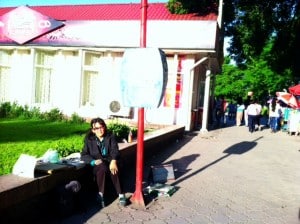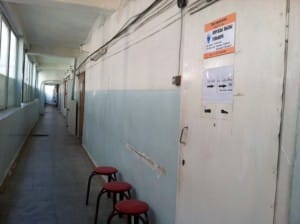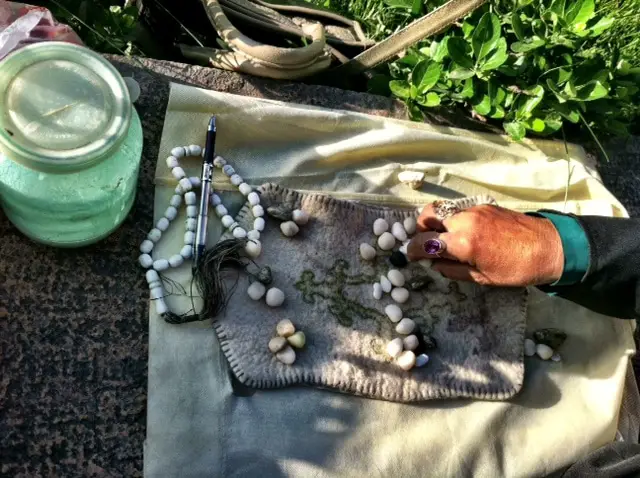Recently, a colleague and I went to a yasnovidyashi, a Kyrgyz fortuneteller (the name actually translates to “Clear Seer”), for the first time. Why? We’ve never done it before, we were looking for a new experience, and we were curious to know more about these infamous women of Bishkek with the “dangerous” reputation of hypnotizing you into a stupor while stealing your jewelry. Call us mini-adventure-seekers. Or fools. We wanted to check it out.
First, we enlisted the help of a local Bishkeker, the friendly and ever-helpful Ph.D student, Bermet, who found a yasnovidyashi through one of her friends. Like most things in life, it is always best to go through personal recommendations. Bermet set up an appointment with this vetted yasnovidyashi for a Friday afternoon at 3:30pm, and settled on a meeting spot on a sidewalk off Sovietskaya Street, Bishkek’s main thorough-way. She really made it easy for us. You could, however, just as easily find yasnovidyashis through ads on the Internet; in newspapers, such as the Kyrgyz-language gazette, Asman (“Heaven”); and on television, such as on the news-and-entertainment channel Piramida (“Pyramid”).
There are many types of yasnovidyashis who can tell you fortunes, or your past, present, or future through cards, palms, and numbers. There are those who say that they can just look at your face and tell everything about you. There are those who can heal you. There are “white witches” (byelie vedmi) who can protect you from the “Evil Eye” (Koz Moichok, in Kyrgyz) — a term generally understood to mean any type of negative energy that causes unhappiness. There are also “black witches” (chornie vedmi) who can harm enemies, through magic rituals, as well as concoct love potions. In fact, many of the yasnovidyashis’ main clients are Muslim women who want to prevent their husbands from taking on a second, third, and fourth wife. I have one Kyrgyz acquaintance whose own aunt went to a yasnovidyashi because her husband was interested in another woman. The yasnovidyashi promptly gave the aunt a “special concoction” to slip into the husband’s drink one night, and sure enough, he left the other woman and returned home.
Since my colleague and I did not have a specific agenda, we opted for a fortuneteller who does cards (she is called a gadalka.) It seemed the most general. So on a warm, sunny Friday afternoon at the designated time, at the designated sidewalk, the three of us — two Americans and our trusted insider, Bermet — approached a 40-something-year-old Slavic-looking woman with reddish hair and wrinkled olive skin, who was sitting on a little box next to a homemade cardboard sign that said, “Gadaiu” (“I tell fortunes.”). She sat there in her crocheted skirt, her faux-designer purse leaning against the box, as pedestrians passed her by without a second glance. She stood up to greet us.

After the initial pleasantries, she then sat down and asked us what we wanted to know. Love? Travels? Family? Past? Future? Caught off-guard by this smorgasbord of choice, I deferred to my colleague. He asked about future travels. She nodded her head and dealt out the cards. He kneeled down in front of her to get comfortable. I knelt, too, and listened. I asked if I could take a picture, but she said no. Understandably, yasnovidyashis are private people. Then for the next 15 minutes or so, she dealt the cards, analyzed them, collected them, and then dealt them out again in different patterns. We all watched eagerly. It turns out she saw more than just travel, but romance. Apparently, my colleague has in store for him a rather complex web of relationships — some new, some resurfacing from the past. To emphasize this, the yasnovidyashi kept pointing to the Queen, who kept surfacing in the cards.
Then came my turn. Unfortunately, what is written in my stars is slightly less “fun.” I’m going to have serious health problems, someone close to me will also have serious health problems, and I will also have a stressful, albeit successful, career. I will also have a husband who I will fight with often but who I will not divorce. Okay then. The yasnovidyashi also talked a bit about my past. Unlike with my colleague, she asked me several times if she was accurate, but I chose to neither confirm nor deny. [She was pretty accurate.]
Then just like that, she folded up her cards, and said, Ladno, vsyo! (“Okay, that’s it!”) I checked my watch. The whole meeting lasted about 30 minutes. She told us it would cost 100 som (about two bucks) apiece. (We later found out that she was actually giving us a deal, for whatever reason. Normally, 15-minute sessions cost 300 som.) We gave her the cash, shook hands pleasantly, then walked away. Our moods were slightly more sober.

In the immediate days after the encounter, I found myself a bit unsettled by the whole thing. One part of me — the cynical part — thought that it was nothing more than an amusing exercise. But another part of me was spooked. I can see now how such a visit could quickly go from “Well, that was fun” to “Well, shoot, what did she mean by that? I think I should go back.” Indeed, walking away from the yasnovidyashi, I suddenly asked Bermet, without thinking, “Soo, does she always sit at the same spot?” Bermet replied gently, “No, Eirene, they always change location.” I nodded my head silently; it was probably for the best. Later, as if to validate my unsettling reaction to the whole matter, Bermet said that she did notice in the last few years that more and more people are visiting yasnovidyashis — and not those who people would consider “uneducated,” but professors and politicians. I asked her why. She said that in fact many people do trust these yasnovidyashis, even if they consult them in secret. She also mentioned that it was most likely a reaction to the current “economic crises.” Some people turn to the mosques, others to the yasnovidyashis.
I think my colleague was also a little affected by our meeting with the yasnovidyashi — though probably for different reasons. A few days later, he was still talking about what the old woman had said to him. “How many women am I getting involved with again? I’m really confused.” And he started going over what the yasnovidyashi had said, while counting on his fingers, as if having a clearer number would better prepare him for what the future awaits.
Upon further reflection, I am glad I got my fortune told, and not only because I can now say that I have met one of these “dangerous” women of Bishkek and came out unscathed (or at least with all my jewelry intact.) I have a healthier appreciation for this subculture of society. These women serve a need in Bishkek, whether it is in the sphere of marital relationships, domestic violence, gender issues, or healthcare. And based on the plethora of yasnovidyashi ads today, and the numerous success stories of yasnovidyashi encounters that I hear through friends and acquaintances, and the fact that Kyrgyzstan is still one of the poorest economies in Central Asia, it seems like these yasnovidyashis will continue to serve this need — be it on the crowded sidewalks of Sovietskaya, or in the dark dwellings of secrecy.





